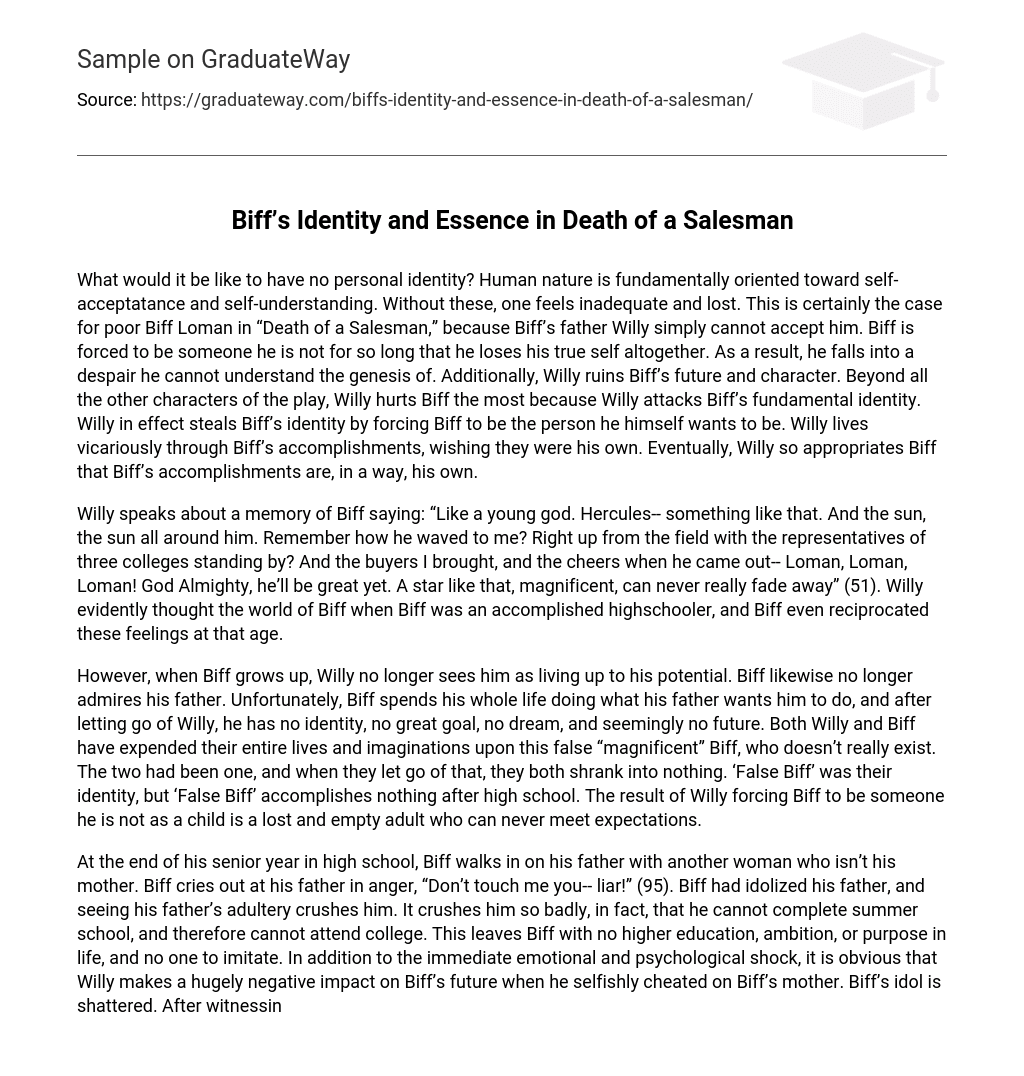What would it be like to lack a personal identity? The nature of humanity is inherently focused on accepting and understanding oneself. Without these qualities, one experiences feelings of inadequacy and being lost. This is specifically true for Biff Loman in “Death of a Salesman” as his father, Willy, is unable to accept him. Biff is compelled to portray a false version of himself for such a long time that he completely loses his true identity. Consequently, he falls into an unexplainable despair. Furthermore, Willy destroys both Biff’s future and character. Among all the characters in the play, Willy inflicts the most harm on Biff because he attacks his core sense of identity. By dictating who Biff should be, Willy essentially steals his son’s identity. Willy lives vicariously through Biff’s achievements, wishing they were his own. Eventually, Willy becomes so intertwined with Biff that Biff’s successes become, to some extent, his own.
Willy reminisces about a memory of Biff being praised as a young god or Hercules by him. He recalls Biff waving to him with the sun shining all around him, while representatives from three colleges and buyers that Willy brought along cheered for him. Willy believed that Biff would achieve greatness and become an enduring star. This illustrates how highly Willy regarded Biff during his prosperous high school years, and it is apparent that Biff reciprocated those sentiments towards Willy at that time.
As Biff grows older, Willy loses faith in his ability to reach his full potential and Biff’s respect for his father diminishes. Tragically, Biff spends his whole life striving to meet his father’s desires. After separating from Willy, he finds himself without a sense of self, a meaningful objective, a dream, or a future. Both Willy and Biff have devoted their lives and imaginations to an imaginary version of Biff that does not truly exist. They were inseparable until they let go of this illusion, which leaves them both feeling insignificant. This constructed persona known as ‘False Biff’ was their identity; however, ‘False Biff’ achieves nothing beyond high school. Willy’s insistence on molding Biff into someone he is not during childhood leads to an adult who feels lost and empty and can never meet expectations.
Biff’s world is shattered when he discovers his father’s infidelity at the end of his senior year. The image of his idolized father engaging in adultery crushes him so deeply that he cannot even finish summer school or pursue a college education. This lack of higher education leaves Biff without ambition or direction in life, and with no one to emulate. The emotional and psychological impact is immediate, but the negative influence of Willy’s selfish actions on Biff’s future becomes clear as well. Unable to handle the shock, Biff distances himself by moving to the countryside where he struggles to find steady employment due to his father’s poor example and absenteeism affecting his character, conscientiousness, and work ethic. Biff’s behavior even manifests kleptomania, a habit likely perpetuated by his father’s failure to teach him better morals. Furthermore, Willy’s encouragement of cheating during high school contributes to Biff’s inadequate education. This is emphasized in a high school flashback where Bernard questions Willy about Biff’s whereabouts during studying, and Willy responds by instructing Bernard to give Biff the answers.
This dialogue is unsettling because of Willy’s complete lack of concern for honesty and his willingness to even encourage deception. Willy projects his own flawed character onto Biff, with no regard for Biff’s well-being, only caring that Biff protects Willy’s reputation. Both men are unsuccessful and morally questionable individuals. Some argue that other family members suffer more from Willy’s actions. For instance, Linda endures the daily struggle of being married to a mentally unstable man who she constantly fears will take his own life. This causes her immense emotional pain as she tries desperately to shield Willy from himself and others. Linda truly faces significant pressure. Additionally, Happy also experiences his fair share of anguish because of Willy. Unlike Biff, Happy receives little attention from his father and is left to navigate life on his own, which is a sorrowful situation for him. However, Biff truly bears the brunt of Willy’s burden as Willy directly instills in Biff a sense of failure.
According to Biff, he pleads, “For Christ’s sake, will you release me? Will you destroy that fake dream before something happens?”. Biff’s desire to change himself is influenced by Willy, and Willy’s actions eliminate any goodness and individuality from Biff’s life. As a result, Biff’s ability to have a successful and fulfilling adulthood is hindered. Losing his identity is particularly painful for Biff, leading to inner turmoil. Willy’s devastation of Biff’s life, character, and adulthood is complete and devastating. However, it is worth questioning whether Biff would have fared much better without Willy.





